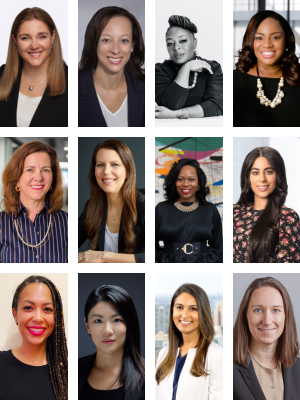 Theglasshammer’s mission since our inception in 2007 is to inform, inspire and empower professional women through advice, events and coaching. By profiling female current and future leaders, we continue to aim to create a digital campfire for successful women to tell their career stories around. In 2024, we’ve had the privilege of connecting with inspiring women—those driving meaningful change, leading with authenticity, and looking to make a positive impact. Once again, we’re thrilled to spotlight the voices of women who are “being the change they want to see”—whether through transforming leadership dynamics, speaking up with their authentic voice, or supporting the next generation of women leaders.
Theglasshammer’s mission since our inception in 2007 is to inform, inspire and empower professional women through advice, events and coaching. By profiling female current and future leaders, we continue to aim to create a digital campfire for successful women to tell their career stories around. In 2024, we’ve had the privilege of connecting with inspiring women—those driving meaningful change, leading with authenticity, and looking to make a positive impact. Once again, we’re thrilled to spotlight the voices of women who are “being the change they want to see”—whether through transforming leadership dynamics, speaking up with their authentic voice, or supporting the next generation of women leaders.
As we reflect on the incredible leaders that we’ve highlighted this year, we’re excited to share their insights and stories of development and resilience (stay tuned for Part 2 next week). A heartfelt thank you to each of the executive women for your time, wisdom, and inspiration! And to the 2024 sponsors Wells Fargo and PGIM who have ensured that there is no cost to the readers of theglasshammer.com to access personal stories and career advice.
Quotes to live by
“The best leaders are those who recognize you don’t have to be the most senior person in the room to bring valuable insight or perspective that drives change or helps to make the optimum decision,” she says. “We’re all here because we have a role to play and a level of expertise in a particular area. Part of my journey has been overcoming my discomfort when faced with resistance and instead, learning how I can better use my knowledge and expertise to address the differing perspectives in a room and influence people to see DEI as a business imperative.” – Natalie Gill, Head of DEI Strategy & Industry Engagement, PGIM
“Going into situations, I’m very aware of who I am. I am a woman. I look different. I don’t think people automatically assume that I’m Black because I am mixed. So, I have a voice, and I use it. Instead of shying away or being self-conscious, I use it as an advantage. I want to be a good representative of women, of women of color, and of diverse women. We all have a voice, and we have to advocate for ourselves.” – Vanessa McMichael: Head of Corporate & Public Entity (CPE) Strategy, Wells Fargo
“You absolutely can be what you don’t see in the world because that is what innovators do. So, if you transfer innovators with trail blazers, that’s what trailblazers do — they see a need in the world, and they find a way to fill it. And I think that the need for each of us that are called trailblazers is unique.” – Kimberly Bryant: Founder and CEO, Black Innovation Lab and Ascend Ventures Tech
“Growth among peers is not a competition, and everyone’s growth path is different. Putting egos aside and collectively pooling our talent and expertise helps ensure that our business’ goals are prioritized, enabling everyone to ultimately be successful,” she says. “At the end of the day, if support and resources I’ve provided can help develop and lift someone else as I climb the corporate ladder, no matter what level they are, I’ve done my job – and I’ve done it well.” – Tara Stafford: Project Manager, PGIM Operations & Innovation
“Respect everyone who is in the room with you. You have been asked to work on a multi-level team, be mindful not just of ‘the boss’, everyone in the room has ideas to bring and value to contribute. By listening to everyone, and respectfully communicating to everyone horizontally, not in silos, you will bring people together to drive forward whatever project or whatever collaboration you’re working on. Work to ensure everyone is engaged in a successful outcome.” – Susan Nickey: Executive Vice President and Chief Client Officer of HASI
“I mentor people that way as well, which is not just to say, ‘okay, let’s have a coffee and I’ll tell you how great you are,’ but ‘let’s have a coffee and discuss where you think you might fall short. Then I’ll tell you what I think or help connect you with people I know will give you a straight answer.’ There are ways to coach that feel good for everybody and there are ways to coach that might feel a bit outside your comfort zone, and you have to do both.”- Jill Ford: Co-head of Equity Capital Markets, Wells Fargo
“You have to be clear on setting boundaries and priorities. Any organization is going to take all that you’re willing to give, so it’s up to you to be the person to set those boundaries for yourself. It doesn’t mean that you’re not going make sacrifices or that there will not be this push and pull constantly, but each time that happens you need to be very thoughtful about whether it’s the right trade-off.” – Shekhinah Bass: Managing Director, Head of Talent Strategy, Goldman Sachs
“I’ve grown through advice and mentorship. When entering rooms with senior stakeholders, I remind myself why I belong, why I should be there, and embody that. In the past, I would almost physically make myself disappear, taking more of a passive role in group discussions, but I have gained the confidence to show up more fully.” – Dania Shahzad: Business Manager, Client Advisory Group, PGIM
“Success stems from a breadth of experiences. The broader your understanding and hands-on involvement across domains, the better equipped you will be to thrive in senior roles. Focusing on the richness and depth of experience versus the speed to get there will pay off in the long-term.” – Rachel Lockett: Vice President of Marketing, MAC Cosmetics
“The most important thing is that you yourself have to walk the talk. For example, after Covid, a lot of people wanted to work from home. But if you want the team to be in the office, you have to show up. You are demonstrating to them, ‘I’m here and this is why we are here: we need to talk to each other, we need to communicate, because we are on the trading floor’.” – Mandy Wan: Managing Director, Head of Markets, Co-Head of CIB APAC, Wells Fargo
“In every role, I continued to stay focused, do great work, think about what my next move was and communicate the career trajectory that I wanted. You have to advocate for yourself. You’re the marketing team behind your own personal brand, and sometimes, that means creating opportunities for yourself that didn’t exist before.” – Anar Patel: Director, Portfolio Construction, PGIM Investments
“Earlier in my career, I thought what mattered to be successful was being excellent at my job and prioritized “doing the work” above all else. Then I came to recognize over time and with seniority that the relationships formed and the collaborative work with others were more impactful. You have to be open to that collaboration and not solely focused on your own success because the success of the collective also matters. Meaning the success of the project, the success of the client, and the success of the firm. That is why the interconnectedness of collaborators in driving value and outcomes is so important.” – Marion Regnier: Partner, Technology Strategy, PwC
We believe coaching is the most effective way to hone broad leadership development goals specifically to each person and their circumstance. Many of the women profiled over the years have been coached by theglasshammer’s cadre of coaches as part of their company’s programmatic leadership development plans. We also work with individuals who want to work on their own development as a leader and can hire us if their company is not providing a coach. Invest in yourself and your career. Sign up to attend our free introduction to coaching to see if coaching could be useful to you- we ask that you are a VP, SVP or MD level in a financial or professional services firm, or a Fortune 500 company to make the cohorts work for consistency of experience and relevance. We will match people to coaches and peers in the cohorts on that basis. The 6 session one-on-one program with 2 (small pod) peer coaching sessions will run for twelve months in 2025 and we have space for 30 women total. This program is not for career changes, feeling stuck or between jobs career coaching (which we can offer but not in this program), this program is for leadership development work. Don’t miss this opportunity to be coached! Program costs are $3,999 per person. Reserve your spot here to hear more: https://calendly.com/evolvedpeople-nicki/coaching-cohort-2025




 By Nicki Gilmour, CEO and Founder of theglasshammer.com
By Nicki Gilmour, CEO and Founder of theglasshammer.com To review 2016 in context of women at work and the progress being made for professional women has been like a textbook case study for me as an organizational psychologist who works in diversity. I hope I can share with you how we can go forward and change the way we do this work. It is obvious that there is work to do and yet I am so incredibly anxious of the capacity of most people to ensure this moment is a launching pad for real progress and not the moment that we spiral down and turn the clock back thirty to hundred years. It truly could go either way. Progress is everyone’s responsibility to take and accountability has to be there- change starts here.
To review 2016 in context of women at work and the progress being made for professional women has been like a textbook case study for me as an organizational psychologist who works in diversity. I hope I can share with you how we can go forward and change the way we do this work. It is obvious that there is work to do and yet I am so incredibly anxious of the capacity of most people to ensure this moment is a launching pad for real progress and not the moment that we spiral down and turn the clock back thirty to hundred years. It truly could go either way. Progress is everyone’s responsibility to take and accountability has to be there- change starts here.